Helena Smith in Athens guardian.co.uk, Sunday 29 January 2012 20.15 GMT
German plan to install commissioner in Athens with veto powers over the Greek budget dismissed as 'laughable'
Greece is opposed to Angela Merkel's plan of putting a commissioner in Athens with veto powers over budget. Photograph: Sean Gallup/Getty Images
Greece has reacted furiously to a German proposal that an EU budget commissioner with oversight of its economy be installed in Athens after mounting speculation that international lenders will have to stump up yet more money for the country.
The escalating row threatened to eclipse Monday's summit after Greece's finance minister, Evangelos Venizelos, issued a tart response to the suggestion, saying his compatriots were themselves capable of fulfilling the "historical obligation" to take the country out of crisis.
The proposal, in a leaked document, argued for the creation of a commissioner with veto powers over the Greek budget, saying Athens' inability to meet fiscal targets had made the post a precondition of further rescue funds from its "troika" of creditors: the EU, IMF and ECB.
"Budget consolidation has to be put under a strict steering and control system," noted the document. "Given the disappointing compliance so far, Greece has to accept shifting budgetary sovereignty to the European level for a certain period of time."
Under the plan, European institutions would have direct control over Greece's budget decisions in what would amount to an extraordinary depletion of a member state's independence in conducting its own affairs.
With the atmosphere among recession-hit Greeks becoming increasingly explosive three years into the crisis, the proposal was angrily denounced with one politician slamming it as the "product of a sick imagination".
"It's absolutely laughable," said a senior government source. "It's a draft paper that appears to have been deliberately leaked but we have no idea who the author is or where it's come from in the German government."
The spat erupted amid reports that the €130bn (£108bn) aid package, agreed as part of a second bailout for the country last October, would now not be enough.
Citing Athens' worsening economic performance and prospects, the German news magazine Der Spiegel quoted a troika official as saying that Greece could need €145bn to be saved once and for all.
Last week, the EU economic and monetary affairs commissioner, Olli Rehn, said a revised analysis had shown that more rescue loans would be needed to make up for a shortfall in the second aid package. The extra money, he said, was required to ensure that Greece's €350bn debt burden was reduced to 120% of GDP by 2020 – a figure that is seen as manageable.
To keep bankruptcy at bay Athens received €110bn from the EU and IMF in May 2010, the biggest bailout in western history.
With European taxpayers already irate that Greece will need yet more funds to keep afloat, the €130bn financial support load had previously been seen as a red line across which no EU government was willing to step.
The spectre of the rescue programme being expanded appeared to be the biggest obstacle to a debt deal between Greece and its private sector creditors finally being concluded over the weekend.
Greek officials said while the contentious issue of interest rates on new bonds had been settled – with one source describing the coupon as "a figure that has pleased everyone" – the agreement would not be announced until there was consensus over the second bailout.
The eurozone's first ever debt restructuring, the bond swap foresees banks and other private investors voluntarily accepting a 50% loss in the value of their holdings, a writedown that will slice about €100bn from the nation's debt pile.
Private sector participation had been set as a prerequisite of further aid being given to Greece. "We are one step before [agreement] being reached," said Venizelos.
With Athens facing repayment of €14.5bn of debt on March 20 – money it does not have – time is of the essence in securing a deal.
But negotiations with international debt inspectors that have been conducted in tandem with talks between the government and private creditors have been vastly different in nature.
In what officials have described as "tense discussions", Greek government ministers have argued fiercely with auditors over the need for further belt-tightening measures to plug a burgeoning budget black hole.
The atmosphere deteriorated last week after the troika urged the interim coalition government to make further savage spending cuts.
The demands come amid growing criticism over the performance of Lucas Papademos, the technocrat economist placed at the helm of Athens's transitional government last November.
Highlighting the mounting frustration over Greece's failure to enact economic and structural reforms, the IMF's managing director, Christine Lagarde, said over the weekend: "We're not terribly positive about what has been done, but we want to put together a programme for the country. The country itself has to provide adjustment."
In a bid to rally support for the austerity Athens will inevitably have to impose, Papademos held urgent talks with the leaders of the three parties backing his coalition telling them that without further belt-tightening Greece will not be given the funds it needs to survive. He emerged saying there had been "a convergence of views".
But with general elections scheduled in the spring and no politician willing to be associated with policies that have brought Greeks to their knees it remains to be seen whether the country's political class will put national interests before party politics.
Eurozone crisis: angry Greeks condemn EU plot to control its finances | World news | guardian.co.uk
![The [Greek] European Tragedy](https://blogger.googleusercontent.com/img/b/R29vZ2xl/AVvXsEiWKI5s90SFm1wWTk6bs4p7CgslaC2SnYPsrZhb-B-smOufNNCSxCvpBLI9hOB-LsXZjir_PNmEiMk2-E62F3xkg96IoC6QFAaZAnPRTVH340IN9WBRmWJqPkjWlgyRj3zpALp7h6hvA58/s920/GkBack_new.jpg)
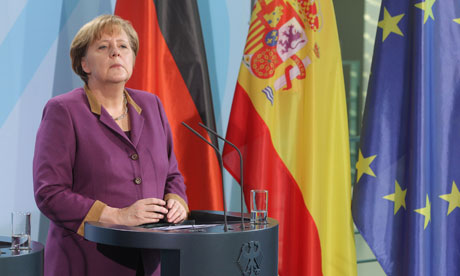




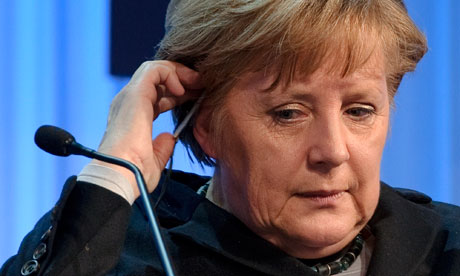

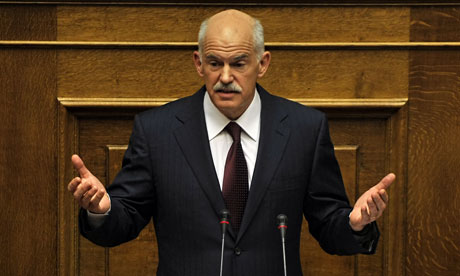

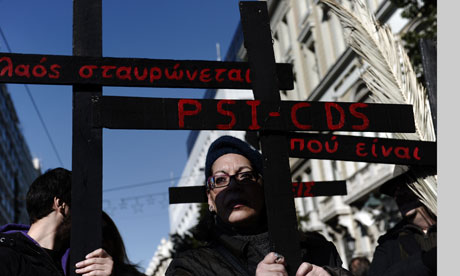





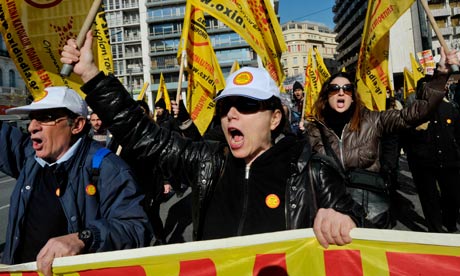


 A Greek tricoteuse before the fall
A Greek tricoteuse before the fall 